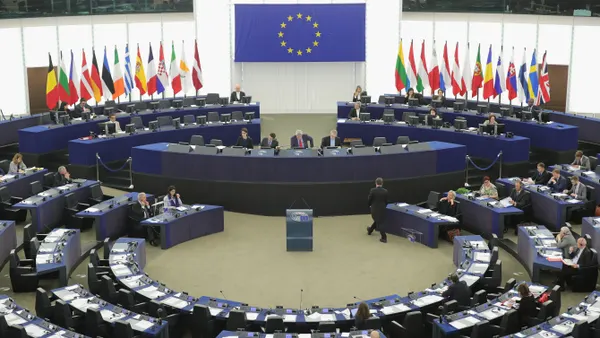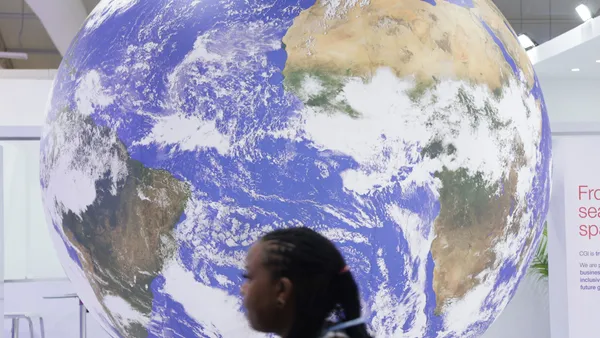Dive Brief:
- Citibank and Wells Fargo shareholders voted on proposals Tuesday asking the banks to increase transparency on their financing decisions with regards to policies on respecting the rights of Indigenous peoples. The proposals went to a vote during the banks’ respective annual general meetings.
- Wells Fargo, who also faced a proposal to issue a report on the alignment of the bank’s lobbying practices with its climate goals, broke with industry norms by not disclosing the preliminary vote counts, according to environmental group Sierra Club. The bank said in its readout of the results that none of the proposals passed.
- Citi released a report on its practices on respecting Indigenous Peoples’ rights last month ahead of the meeting, though the proposal’s filers said the report was “not responsive” to its proposal and urged shareholders to still support the resolution, according to a filing submitted to the Securities and Exchange Commission. The proposal garnered 26% support Tuesday, down from 31% who supported the resolution last year.
Dive Insight:
The resolution was proposed to both boards by the Sisters of St. Joseph of Peace, a group of investor nuns from New Jersey, and presented before Citi’s board by Juan Mancias, tribal chairman of the Carrizo Comecrudo Tribe of South Texas and to the Wells Fargo board by tribal attorney Tara Houska, founder of the environmental group Giniw Collective, according to a recap from the Sunrise Project sent to ESG Dive. It is the third year such a resolution has been filed at Citi, and it is the second straight year the proposal was supported by more than a quarter of voters.
The proposals, included in proxy materials for Citi and Wells Fargo, took issue with the banks decisions to finance the Dakota Access Pipeline in 2016 and provide funding to Enbridge for its Line 2 ad Line 5 tar sands routes. Both projects were opposed by Indigenous rights activists and Native American tribes.
The vote outcome at Citi will allow the Sisters of St. Joseph of Peace to resubmit the proposal again next year, Sister Susan Francois said in an emailed statement.
“For three years in a row support from investors for our resolution has remained steady at Citi,” Francois said in an emailed release. “This is a clear message to the bank that human rights violations are bad for business.”
Citi declined to take questions on the proposal during the meeting, despite noting several shareholder questions had been tabled, the Sunrise Project told ESG Dive.
Citi’s board meeting came a day after it released its 2023 ESG report, which showed the bank had financed $441.2 billion of its goal to spend $1 trillion on sustainable financing by 2030. The report showed the bank had met more than half of its goals to decrease its operational footprint by 2025.
The ESG report also included the bank’s Indigenous rights report it released earlier in April, which explained the bank’s due diligence process on respecting Indigenous Peoples rights in financing projects. Citi said its Environmental Social Risk Management Policy is aligned to international frameworks, noting that its due diligence process flagged 37 transactions for having potential risks to Indigenous peoples. The bank said it declined seven of those transactions for concerns about the risks to Indigenous peoples’ rights.
The bank said of the 37 transactions, seven were project related — three loans and four other project related transactions. Three of those were declines, two were reviewed and approved after due diligence, one was approved with ongoing monitoring required and one is still in an early stage of review.
“We recognize the unique historical challenges faced by Indigenous Peoples and understand that their languages, beliefs, cultural values and lands often face threats placing them at a higher degree of vulnerability than other communities,” the bank said in its Indigenous Peoples report. “Our Environmental and Social Risk Management Policy acknowledges this vulnerability and outlines our approach to transactions that may have the potential to impact Indigenous Peoples.”
The Sisters of St. Joseph of Peace said the report missed the mark of the resolution in the April 11 filing submitted to the SEC, which pushed for shareholder support. The filing said the proposal asked the bank to examine the effectiveness of its policies, and said Citi’s current due diligence process “appears ineffective” at mitigating risks.
“Citigroup and its investors are exposed to significant risk if it continues to finance projects and clients developing projects that violate the rights of Indigenous Peoples and exacerbate the climate crisis,” the filing said.
However, a confidential report prepared by the bank last year showed Citi could also lose billions in loan book losses if the climate transition gains speed, according to the report, seen by Reuters. The outlet reported Wednesday that the bank’s analysis showed that if efforts to hit net-zero increase globally, the bank’s loan sheets could see $10.3 billion in losses, compared to $7.1 billion in losses at the current pace.
Investors will need to wait for Wells Fargo’s 8-K filing with the SEC to see the final vote count on the Indigenous Peoples Rights proposal, as well as the climate lobbying alignment report and two other lobbying transparency resolutions.
Both board meetings were also preceded by climate protests from activists outside of both bank’s headquarters last week. The protest in front of Citi’s New York City headquarters led to “multiple” arrests,” according to local coverage.
Ben Cushing, director of the Fossil-Free Finance campaign for environmental group Sierra Club, said in a press release that proxy season is showing consistent investor support for increased transparency on climate and human rights. The NYC Comptroller’s clean energy proposals received support from over a quarter of investors during annual board meetings at Bank of America and Goldman Sachs last week, despite not passing.
“It’s past time for Citi, Wells Fargo, and other big banks to heed the calls of investors and finally address the impacts of their financing activities on Indigenous communities, and commit to end financing for projects and companies violating their rights,” Cushing said.










